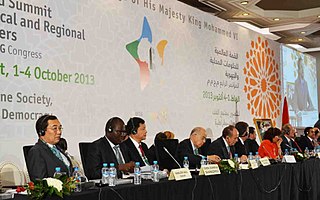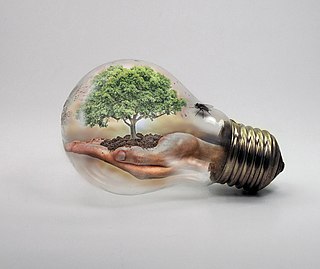AIESEC is an international youth-run and led, non-governmental and not-for-profit organization that provides young people with leadership development, cross-cultural internships, and global volunteer exchange experiences. The organization focuses on empowering young people to make a progressive social impact. The AIESEC network includes approximately 40,000 members in 120+ countries.
The United Nations Association of the United States of America (UNA-USA) is a nonprofit grassroots organization dedicated to promoting political and public support for the United Nations among Americans. A program of the United Nations Foundation, its mission includes advocating for greater U.S. leadership at the UN, improving and enhancing the UN system, and implementing the Sustainable Development Goals and the UN Charter in both the U.S. and globally.
The United Nations Volunteers (UNV) programme is a United Nations organization that contributes to peace and development through volunteerism worldwide.

Prince Cedza Dlamini of Swaziland, otherwise known as Prince Cedza, grandson of King Sobhuza II of Swaziland and step-grandson of Nelson Mandela, is a humanitarian, youth activist, spokesman for the United Nations' Millennium Development Goals, and the founder of the Ubuntu Institute for Young Social Entrepreneurs. His work promotes future international cooperation by initiating and supporting global networks of young leaders through which they can work collectively to address such current world problems as HIV/AIDS, poverty, hunger and illiteracy. Prince Cedza also advocates stronger ties between the United States and South Africa, occupying a seat as a director on the board of the South African Chamber of Commerce in America.

The International Volunteer Day for Economic and Social Development, more commonly referred to as International Volunteer Day (IVD), is an international observance mandated by the UN General Assembly in 1985. It offers an opportunity for volunteer-involving organizations and individual volunteers to promote volunteerism, encourage governments to support volunteer efforts, and recognize volunteer contributions to the achievement of the Sustainable Development Goals (SDGs) at local, national, and international levels. International Volunteer Day is marked and supported by the United Nations Volunteers (UNV) programme. UNV coordinates a campaign to promote IVD every year.

United Cities and Local Governments (UCLG) is an umbrella international organisation for cities, local and regional governments, and municipal associations throughout the world that is concerned with representing and defending the interests of local governments on the world stage.

The Post-2015 Development Agenda was a process from 2012 to 2015 led by the United Nations to define the future global development framework that would succeed the Millennium Development Goals. The new framework, starting from 2016 is called Sustainable Development Goals.

The Sustainable Development Goals (SDGs) or Global Goals are a collection of seventeen interlinked objectives designed to serve as a "shared blueprint for peace and prosperity for people and the planet, now and into the future." The SDGs are:
- No poverty
- Zero hunger
- Good health and well-being
- Quality education
- Gender equality
- Clean water and sanitation
- Affordable and clean energy
- Decent work and economic growth
- Industry, innovation and infrastructure
- Reduced inequalities
- Sustainable cities and communities
- Responsible consumption and production
- Climate action
- Life below water
- Life on land
- Peace, justice, and strong institutions
- Partnerships for the goals

The Secretary-General's Envoy on Youth serves as a global advocate for addressing the needs and rights of young people for bringing the United Nations closer to them. The Envoy's Office is part of the United Nations Secretariat and supports multi-stakeholder partnerships related to the United Nations system-wide action plan on youth to volunteer initiatives. The office also promotes the empowerment and foster the leadership of youth at the national, regional, and global levels, including through exploring and encourages mechanisms for young people’s participation in the work of the United Nations and in political and economic processes with a special focus on the most marginalized and vulnerable youth.

Established in 1992, the Major Group for Children and Youth is the United Nations General Assembly mandated, official, formal and self-organised space for children and youth to contribute to and engage in certain intergovernmental and allied policy processes at the United Nations.

Action for Climate Empowerment (ACE) is a term adopted by the United Nations Framework Convention on Climate Change (UNFCCC). It refers to Article 6 of the Convention's original text (1992), focusing on six priority areas: education, training, public awareness, public participation, public access to information, and international cooperation on these issues. The implementation of all six areas has been identified as the pivotal factor for everyone to understand and participate in solving the complex challenges presented by climate change. The importance of ACE is reflected in other international frameworks such as the Sustainable Development Goals ; the Global Action Programme for Education for Sustainable Development ; the Aarhus Convention (2011); the Escazú Agreement (2018) and the Bali Guidelines (2010).
The United Nations Development Programme (UNDP) in South Africa is one of the 177 offices of the UNDP’s global networks located in the country's capital, Pretoria. Its vision is to empower people's lives and help nations to become stronger and more resilient. As a part of the wider UNDP's development efforts, the local office is responsible for supporting the government to develop and implement policies to accelerate the attainment of the Sustainable Development Goals (SDG) in South Africa. UNDP interventions in South Africa focus on promoting actions that contribute to address the triple challenge of inequality, poverty and unemployment that the county faces. In that regard, the interventions include the promotion of youth employment; building resilience to climate change impacts; biodiversity conservation; water management; promotion of access to sustainable, clean and affordable energy; and promotion of citizens participation in democratic processes. Leaving no-one behind, gender mainstreaming and innovation are in the center of all UNDP cooperation.

Sustainable Development Goal 13 is to limit and adapt to climate change. It is one of 17 Sustainable Development Goals established by the United Nations General Assembly in 2015. The official mission statement of this goal is to "Take urgent action to combat climate change and its impacts". SDG 13 and SDG 7 on clean energy are closely related and complementary.

Sustainable Development Goal 11, titled "sustainable cities and communities", is one of 17 Sustainable Development Goals established by the United Nations General Assembly in 2015. The official mission of SDG 11 is to "Make cities inclusive, safe, resilient and sustainable". The 17 SDGs take into account that action in one area will affect outcomes in other areas as well, and that development must balance social, economic and environmental sustainability.

Sustainable Development Goal 8 is about "decent work and economic growth" and is one of the 17 Sustainable Development Goals which were established by the United Nations General Assembly in 2015. The full title is to "Foster sustained, inclusive and sustainable economic growth, full and productive employment and decent work for all." Progress towards targets will be measured, monitored and evaluated by 17 indicators.

Sustainable Development Goal 2 aims to achieve "zero hunger". It is one of the 17 Sustainable Development Goals established by the United Nations in 2015. The official wording is: "End hunger, achieve food security and improved nutrition and promote sustainable agriculture". SDG 2 highlights the "complex inter-linkages between food security, nutrition, rural transformation and sustainable agriculture". According to the United Nations, there are around 690 million people who are hungry, which accounts for slightly less than 10 percent of the world population. One in every nine people goes to bed hungry each night, including 20 million people currently at risk of famine in South Sudan, Somalia, Yemen and Nigeria.

Global Goals Week is a shared commitment between a coalition of over 160 partners across all industries, which mobilizes annually in September to bring together communities, demand urgency, and supercharge solutions for the Sustainable Development Goals (SDGs). It was founded in 2016 by the United Nations Foundation, Project Everyone, and the United Nations Development Programme (UNDP). It is timed to coincide with the UN General Assembly "High-Level Week" in New York. The week includes events, summits, conferences, forums, workshops, pledges, and other activations in New York, around the world, and online. It usually runs alongside Climate Week NYC, the annual conference of Goalkeepers, Bloomberg Global Business Forum and many other high-level events.

Sustainable Development Goals and Nigeria is about how Nigeria is implementing the Sustainable Development Goals within the thirty-six states and its Federal Capital Territory (FCT). The Sustainable Development Goals (SDGs) consist of seventeen global goals designed as a "blueprint to achieve a better and more sustainable future for all". Each of the 17 goals is expected to be achieved by 2030 in every country around the world.
Sustainable Development Goals and Lebanon explains major contributions launched in Lebanon towards the advancement of the Sustainable Development Goals SDGs and the 2030 agenda.
Nigeria Youth SDGs Network which is registered as the Network of Youth for Sustainable Initiative is a youth led and youth serving civil society organization localizing the United Nations Sustainable Development Goals launched in April 2017.












